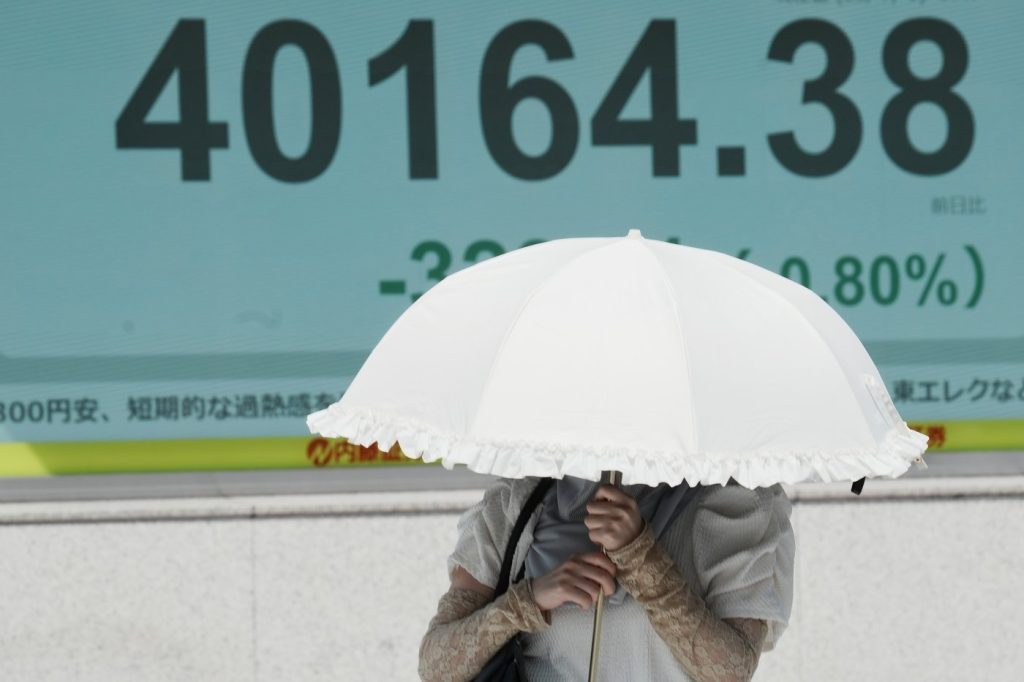Asian shares have shown a predominantly positive trend following the performance of U.S. stocks, which concluded a second consecutive month of growth at record levels. However, U.S. futures and oil prices have dipped.
In Japan, the Nikkei 225 index experienced a decline of 1.2%, settling at 40,003.24 points, despite the Bank of Japan's quarterly Tankan survey revealing better-than-expected improvement in business sentiment among large manufacturers.
Conversely, the Shanghai Composite index recorded a slight gain of 0.2%, closing at 3,451.69. This increase followed the release of China's official manufacturing purchasing managers' index (PMI), which rose to 49.7 in June, its highest in three months. Additionally, the PMI for services and other non-manufacturing sectors also reached a three-month peak of 50.5.
The stock market in Hong Kong was closed on Tuesday, whereas South Korea’s KOSPI Composite Index surged by 1.5% to 3,117.17, driven by a rebound in exports for June. This improvement was attributed to heightened demand for semiconductors, ships, health products, and automobiles. Min Joo Kang of ING Economics noted that while exports of electric vehicles to the European Union and solid used-car exports helped offset declines in U.S. exports, automotive exports might face challenges due to tariffs and increased production in the U.S.
Australia’s S&P/ASX 200 saw a minor increase of 0.1%, reaching a total of 8,550.80. In Manila, the Philippine Stock Exchange Index (PSEi) rose by 0.2%.
On Wall Street, stocks continued their upward trajectory. The S&P 500 saw an increase of 0.5% to 6,204.95, marking a remarkable recovery from a previous sell-off in spring that saw a drop of approximately 20%. The Dow Jones Industrial Average gained 0.6%, closing at 44,094.77, while the Nasdaq composite also rose by 0.5%, finishing at 20,369.73.
The rally in U.S. stocks was supported by positive developments, including Canada’s decision to abandon a planned tax on U.S. technology firms and the resumption of trade talks with the United States. These talks had previously been put on hold by U.S. President Donald Trump due to the tax, which he described as a "direct and blatant attack" on the U.S. economy.
There's an overall sentiment that the stock market recovery could increase the likelihood of Trump re-initiating high tariffs similar to those imposed from 2018 to 2019. In a notable upward shift, Oracle's stock rose by 4%, driven by CEO Safra Catz’s remarks of a strong start to the fiscal year and multiple large cloud services agreements that could yield over $30 billion in annual revenue over the next two years.
GMS Holdings experienced an 11.7% surge in stock value after announcing an agreement to sell itself to a Home Depot subsidiary, with the deal valued at approximately $5.5 billion including debt. In a competitive landscape, QXO had previously offered to buy GMS for $95.20 per share, yet after news of the Home Depot bid, QXO's stock rose by 3.9%, while Home Depot’s shares dipped by 0.6%.
Moreover, shares of Hewlett Packard Enterprise surged by 11.1%, and Juniper Networks climbed by 8.4%, following news that an agreement with the U.S. Department of Justice may facilitate their merger, pending court approval. Hewlett Packard Enterprise is pursuing Juniper in a $14 billion acquisition deal.
Bank stocks were notably robust after a positive assessment from the Federal Reserve, which indicated that these financial institutions are sufficiently resilient to withstand an economic downturn. Noteworthy gainers included JPMorgan Chase, which rose by 1%, and Citigroup, which increased by 0.9%.
In the bond market, Treasury yields dropped ahead of several significant economic reports expected later in the week, particularly the jobs report scheduled for Thursday, one day earlier than usual due to the forthcoming Fourth of July holiday.
In other market activities early Tuesday, benchmark U.S. crude oil prices decreased by 37 cents to $64.74 per barrel, while Brent crude, the international benchmark, fell by 35 cents to $66.39 per barrel. The U.S. dollar decreased to 143.86 Japanese yen from a previous 144.04 yen, whereas the euro increased to $1.1792 from $1.1789.











